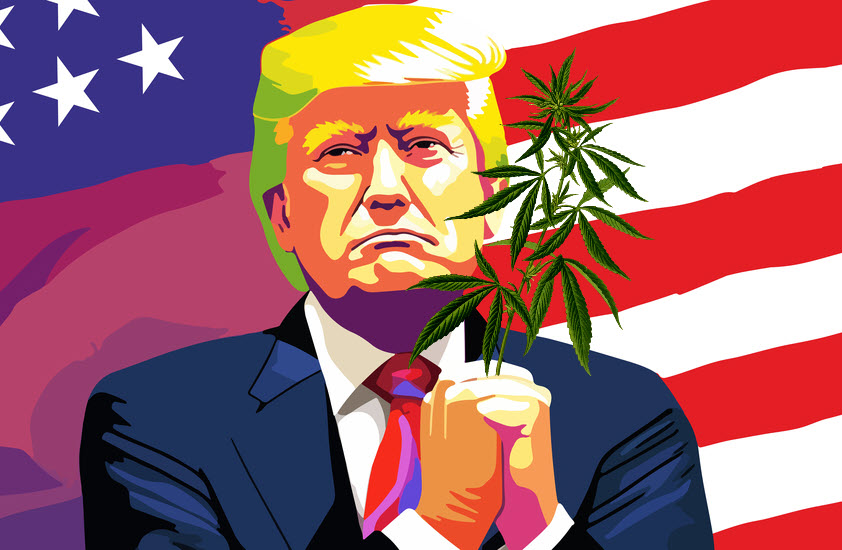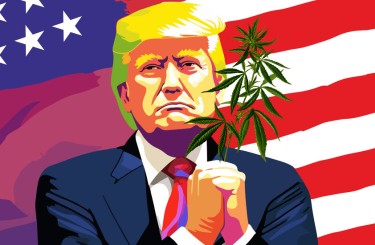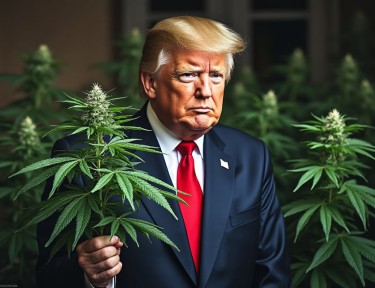Cannabis News
$5.7 Billion in Tax Revenue in the Last 18 Months and Anti-Pot Groups Worry the Weed Biz Would Get Too Big with Rescheduling?
Published
1 year agoon
By
admin

Eleven former high-ranking officials, including six ex-DEA heads and five former White House drug czars, have opposed the U.S. Department of Health and Human Services’ recommendation to reschedule marijuana. They sent a letter to the current Attorney General and DEA Administrator, expressing concern over this proposal.
Rescheduling Debate
The letter suggests that rescheduling marijuana to Schedule III could “supersize” the industry through tax relief and market normalization. It also argues that rescheduling would reduce penalties for marijuana trafficking, potentially hindering cartel prosecution. Legal experts, however, challenge this claim, highlighting that penalties for drug trafficking are not directly linked to the drug’s scheduling under the Controlled Substances Act.
Remember, states have collected over $5.7 billion in tax revenue in the past 18 months just from marijuana sales. One, the industry already is supersized. Two, who is complaining if the number jumps to $12.8 billion or $14.3 billion after rescheduling? Will towns and cities complain with all the new tax revenue coming in to build schools, fix roads, and help with treatment centers?
Whaaaaaaa?
Penalties for cannabis trafficking differ based on the amount involved. For instance, trafficking up to 50 kilograms mandates a minimum five-year prison sentence and a maximum $250,000 fine for a first offense, while trafficking 1,000 kilograms carries a ten-year minimum sentence. However, these penalties are specific to marijuana.
Therefore, the assumption that rescheduling marijuana would automatically reduce these penalties is questionable and largely reliant on potential future statutory changes by Congress. Unlike other substances, changing the schedule for marijuana does not directly alter the associated criminal penalties. Legal experts emphasize this point, asserting that the former federal drug agency heads’ claim in their letter is inaccurate.
Kevin Sabet, who leads the prohibitionist organization Smart Approaches to Marijuana (SAM), has consistently argued against the notion that criminal penalties for federal drug offenses are directly tied to the drug’s scheduling status. He even criticized a member of Congress for allegedly misunderstanding this disconnection between scheduling and penalties. Nevertheless, some scholars contend that rescheduling marijuana could reduce penalties under the Controlled Substances Act (CSA).
Furthermore, it’s worth noting that judges and prosecutors typically possess discretion and might opt for lesser penalties in the event of federal rescheduling, even if not legally mandated. Despite seeking clarification from the DEA, Marijuana Moment received no response and was referred to the Justice Department for inquiries about criminal penalties and prosecutions, which remained unaddressed.
The former DEA heads and White House drug czars argue in their letter that rescheduling marijuana to Schedule III would have an effect of expanding the cannabis industry in the United States. This change would provide them with the opportunity to circumvent IRS Section 280E, granting businesses the ability to write off their expenditures.
As a result, marijuana companies could deduct expenses related to youth-oriented advertising and the sale of cannabis products aimed at children, potentially fueling a substantial surge in the industry’s commercialization prospects.
Around a year ago, President Joe Biden initiated a comprehensive examination of marijuana scheduling, with HHS conducting an exhaustive 11-month scientific evaluation. This evaluation ultimately recommended reclassifying cannabis to Schedule III within the framework of the Controlled Substances Act. The decision now rests with the DEA, as the health agency’s scientific findings carry binding weight, though the law enforcement agency retains the authority to disregard this recommendation.
The Research Gap
Ex-DEA administrators and ONDCP directors have communicated in their letter that the DEA ought to dismiss the scientific findings of HHS and oppose the reclassification of marijuana to Schedule III. They expressed severe reservations, arguing that there hasn’t been any recent evidence in the past seven years warranting a shift in marijuana’s classification.
They highlighted that Schedule I drugs lack accepted medical use, and the FDA has not endorsed raw marijuana due to a lack of double-blind, published studies demonstrating its safety and efficacy. However, these studies face significant obstacles due to marijuana’s Schedule I status, a concern shared by other prominent health officials, including NIDA Director Nora Volkow.
The letter from former DEA administrators and ONDCP directors delves into several common prohibitionist arguments, touching on concerns like increased THC potency, potential misuse, and the limitations of legalization in curbing the illicit market. They point out that reclassifying marijuana to Schedule III would benefit cannabis companies by allowing them to deduct business expenses, leading to higher profits, more advertising, and greater commercialization.
IRS Code 280E restricts tax deductions for businesses marketing Schedule I or II controlled substances, subjecting the industry to a higher effective tax rate. They argue that since a 2016 review, which found no accepted medical value and high abuse potential, there has been no new evidence to warrant reclassification.
Numerous studies conducted since 2016 have linked cannabis to various positive health effects. Additionally, more states have legalized it for medical use, addressing a wide range of conditions. Notably, the officials pointed to research suggesting that marijuana is more addictive than some other Schedule I substances, such as LSD, GHB, ecstasy, and khat.
However, they didn’t propose rescheduling these substances, despite MDMA (ecstasy) being designated as a breakthrough therapy by the FDA, potentially gaining federal approval as a medication next year. The letter underscores the argument against rescheduling marijuana, emphasizing the need for large-scale clinical trials to outweigh its risks for patients it aims to treat, based on a NIDA factsheet.
The letter fails to acknowledge the criticism of drug criminalization and Schedule I designations from the long-standing head of the same agency, Dr. Nora Volkow. In 2021, she noted a lack of evidence for occasional marijuana use harming adults. She highlighted the complications of criminalizing drug use, research barriers, and the structurally racist impact of the drug war.
In contrast, the former drug officials argue in their letter that if specific marijuana compounds prove medically valuable, few would oppose FDA-approved marijuana-derived medications.
They point to the federal approval of synthetic THC medication dronabinol as an example.
They also challenge the notion that rescheduling would significantly enhance research, citing the expensive and largely private nature of drug development as a potential barrier to the creation of more marijuana-based medications.
Research Funding
The former DEA and ONDCP leaders, with a history of service under presidents from both major political parties, penned a letter calling on the National Institutes of Health (NIH). They have asked NIH to finance research examining both the potential medical benefits of marijuana and the dangers linked to highly potent cannabis products.
They underscored marijuana’s addictive qualities and the absence of recognized medical applications, raising apprehensions about how rescheduling might affect law enforcement efforts and prosecutions related to drug trafficking.
As advocates and lawmakers marked the first anniversary of President Biden’s mass marijuana pardon and scheduling directive, they called for more comprehensive reform and federal legalization. Additionally, two GOP senators introduced legislation to prevent cannabis rescheduling without congressional approval.
In contrast, a coalition of 14 Republican congressional lawmakers urged the DEA to maintain marijuana’s most restrictive CSA classification and reject the federal health agency’s rescheduling recommendation.
Conclusion
The letter from former DEA and ONDCP heads illustrates the ongoing debate surrounding marijuana rescheduling. While they express concerns about the potential risks of rescheduling, advocates, and lawmakers are pushing for comprehensive reform, highlighting the need for more research and the changing landscape of cannabis acceptance in society. This dynamic and evolving conversation underscores the complex nature of marijuana policy in the United States.
WHO IS DOESN’T WANT TO SEE WEED LEGALIZED, READ ON..
You may like
-


Latest Trump Weed Rumor – Trump Will Federally Deschedule and Decriminalize Cannabis, but Not Legalize It
-


Webinar Replay: Post-Election Cannabis Wrap – Smoke ’em if You’ve Got ’em
-


I Had Just One Puff
-


Marijuana firms Eaze, Green Dragon find new life after $10 million capital infusion
-


Get some rest on Modified Grapes—November’s Leafly HighLight
-


Is Kratom Addictive? Understanding Dependence, Risks, and Safe Usage
Cannabis News
Latest Trump Weed Rumor – Trump Will Federally Deschedule and Decriminalize Cannabis, but Not Legalize It
Published
11 hours agoon
November 14, 2024By
admin

In a recent interview, former New Jersey Governor Chris Christie made headlines by asserting that President-elect Donald Trump will pursue significant reforms in federal policies regarding marijuana and cryptocurrency. As the nation grapples with evolving attitudes toward cannabis and the burgeoning digital currency market, Christie’s predictions have ignited discussions about the potential implications of such changes on both industries. This article delves into Christie’s insights, the current state of marijuana and cryptocurrency regulations, and the broader implications of these anticipated reforms.
The Current Landscape of Marijuana Legislation
Federal vs. State Laws
Marijuana remains classified as a Schedule I substance under the Controlled Substances Act (CSA), which places it in the same category as heroin and LSD. This classification has created a complex legal landscape where states have moved to legalize cannabis for medical and recreational use, while federal law continues to impose strict prohibitions. As of now, over 30 states have legalized marijuana in some form, leading to a burgeoning industry that generates billions in revenue.
Challenges Faced by the Cannabis Industry
Despite its legality in many states, the cannabis industry faces significant hurdles due to federal restrictions. These challenges include:
-
Banking Access: Many banks are hesitant to work with cannabis businesses due to fear of federal repercussions, forcing these businesses to operate largely in cash.
-
Taxation Issues: The IRS enforces Section 280E of the tax code, which prohibits businesses engaged in illegal activities from deducting normal business expenses, leading to disproportionately high tax burdens for cannabis companies.
-
Interstate Commerce: The lack of federal legalization prevents cannabis businesses from operating across state lines, limiting their growth potential.
Chris Christie’s Perspective on Marijuana Reform
Christie, a former presidential candidate known for his tough stance on drugs during his tenure as governor, has evolved his views on marijuana over the years. In his recent statements, he emphasized that Trump is likely to pursue descheduling cannabis, which would remove it from the Schedule I classification. This move would not only provide clarity for businesses operating in legal markets but also open avenues for banking and investment.
Christie highlighted that descheduling would allow for a more regulated market where safety standards could be established, thus protecting consumers. He believes that this approach aligns with a growing consensus among Americans who support legalization and recognize the potential benefits of cannabis use for both medical and recreational purposes.
The Future of Cryptocurrency Regulation = The Rise of Cryptocurrencies
Cryptocurrencies have surged in popularity over the past decade, with Bitcoin leading the charge as the first decentralized digital currency. The market has expanded to include thousands of alternative coins (altcoins), each with unique features and use cases. As cryptocurrencies gain traction among investors and consumers alike, regulatory scrutiny has intensified.
Current Regulatory Challenges
The cryptocurrency market faces several regulatory challenges that hinder its growth and adoption:
-
Lack of Clarity: Regulatory frameworks vary significantly across states and countries, creating confusion for investors and businesses.
-
Fraud and Scams: The rapid growth of cryptocurrencies has led to an increase in fraudulent schemes targeting unsuspecting investors.
-
Consumer Protection: Without clear regulations, consumers are often left vulnerable to risks associated with volatile markets.
Christie’s Vision for Crypto Regulation
Christie believes that under Trump’s leadership, there will be an effort to find a “sweet spot” for cryptocurrency regulation balancing innovation with consumer protection. He argues that overly stringent regulations could stifle growth in this emerging sector while too little oversight could expose consumers to significant risks.
In his view, a balanced regulatory framework would include:
1. Clear Definitions: Establishing clear definitions for different types of cryptocurrencies and tokens to differentiate between securities and utility tokens.
2. Consumer Protections: Implementing measures to protect investors from fraud while promoting transparency within the market.
3. Encouraging Innovation: Creating an environment conducive to innovation by allowing startups to thrive without excessive regulatory burdens.
Christie’s insights reflect a growing recognition among policymakers that cryptocurrencies are here to stay and that appropriate regulations are necessary to foster growth while safeguarding consumers.
Implications of Proposed Reforms
Economic Impact
The potential reforms proposed by Christie could have far-reaching economic implications:
-
Job Creation: Legalizing marijuana at the federal level could lead to significant job creation within the cannabis industry—from cultivation and production to retail sales.
-
Investment Opportunities: Descheduling cannabis would open up investment opportunities for institutional investors who have been hesitant due to federal restrictions.
-
Boosting Local Economies: Legal cannabis markets have proven beneficial for local economies through increased tax revenues and job creation.
Similarly, clear regulations around cryptocurrencies could stimulate investment in blockchain technology and related industries, fostering innovation and economic growth.
Social Justice Considerations
Both marijuana legalization and sensible cryptocurrency regulations have social justice implications:
-
Addressing Past Injustices: Legalizing marijuana could help rectify past injustices related to drug enforcement policies that disproportionately affected marginalized communities.
-
Financial Inclusion: Cryptocurrencies offer opportunities for financial inclusion for those underserved by traditional banking systems, particularly in low-income communities.
Political Landscape
The political landscape surrounding these issues is complex. While there is bipartisan support for marijuana reform among certain lawmakers, challenges remain in overcoming entrenched opposition. Similarly, cryptocurrency regulation has garnered attention from both sides of the aisle but requires collaboration to establish effective frameworks.
Conclusion
Chris Christie’s predictions about President-elect Donald Trump’s approach to federal marijuana descheduling and cryptocurrency regulation suggest a potential shift in U.S. policy that could significantly reshape both industries. As public opinion evolves on these issues, lawmakers have an opportunity to enact meaningful reforms that promote economic growth while ensuring consumer protection. The anticipated changes could foster a more robust cannabis industry that contributes positively to the economy and addresses social justice concerns, while clear regulatory frameworks for cryptocurrencies could encourage innovation and protect consumers in the digital economy. Stakeholders in both sectors are closely watching these developments, eager to see how potential reforms might impact their futures. While the realization of Christie’s predictions remains uncertain, it’s clear that the conversation around marijuana and cryptocurrency regulation is ongoing and far from settled.
TRUMP 2.0 ON CANNABIS REFORM, READ ON…
TRUMP 2.0 ON FEDERAL CANNABIS REFORM – WHAT DO WE KNOW?
Cannabis News
Webinar Replay: Post-Election Cannabis Wrap – Smoke ’em if You’ve Got ’em
Published
1 day agoon
November 13, 2024By
admin
On Thursday, November 7th, Vince Sliwoski, Aaron Pelley and Fred Rocafort held a post election discussion “Post-Election Cannabis Wrap – Smoke ’em if You’ve Got ’em”. Watch the replay!
Key Takeaways from the “Smoke ’em if You’ve Got ’em – 2024 Post Election Cannabis Wrap” Webinar:
- Panelists:
- Vince Sliwoski: Oregon Business lawyer specializing in cannabis and commercial real estate.
- Aaron Pelley: Experienced in cannabis law since Washington’s legalization in 2012.
- Fred Rocafort: Trademark attorney working closely with the cannabis team.
- Election Results Overview:
- Most 2024 cannabis ballot measures did not pass.
- Florida, South Dakota, and North Dakota saw failures.
- Nebraska became the 39th state to legalize cannabis for medical use when it passed two cannabis initiatives, Initiatives 437 and 438.
- Federal and State-Level Developments:
- Medical use is currently legal in 38 states, and 24 states allow recreational use.
- Republican support for marijuana legalization is growing.
- Federal Policy Implications:
- Schedule III Rescheduling: The process to move cannabis to Schedule III is ongoing, which could significantly impact the industry.
- Importance of Federal Appointments: The future of cannabis policy depends heavily on who is appointed to key positions in the administration.
- International and Domestic Trade:
- Schedule III status could ease import/export restrictions on cannabis.
- Unified control of House, Senate, and presidency might expedite legislative progress.
- Economic and Industry Impact:
- Cannabis stocks experienced volatility post-election, reflecting investor uncertainty.
- Federal legalization and banking reforms are crucial for industry stability and growth.
- Future Outlook:
- The potential for federal rescheduling remains strong, with hearings scheduled for early 2025.
- State-level initiatives and regulatory developments will continue to shape the industry.


“How Long Does One Puff of Weed Stay in Your System?”… This topic can be difficult to answer since it is dependent on elements such as the size of the hit and what constitutes a “one hit.” If you take a large bong pull then cough, it might linger in your system for 5-7 days. A moderate dose from a joint can last 3-5 days, whereas a few hits from a vaporizer may last 1-3 days.
The length of time that marijuana stays in the body varies based on a number of factors, including metabolism, THC levels, frequency of use, and hydration.
Delta-9-tetrahydrocannabinol, or THC, is the primary psychoactive component of cannabis. THC and its metabolites, which remain in your body long after the effects have subsided, are detected by drug tests.
Since these metabolites are fat-soluble, they cling to bodily fat molecules. They could thus take a while to fully pass through your system, particularly if your body fat percentage is higher.
THC is absorbed by tissues and organs (including the brain, heart, and fat) and converted by the liver into chemicals such as 11-hydroxy-THC and carboxy-THC. Cannabis is eliminated in feces at a rate of around 65%, while urine accounts for 20%. The leftover amount might be kept within the body.
THC deposited in bodily tissues ultimately re-enters the circulation and is processed by the liver. For frequent users, THC accumulates in fatty tissues quicker than it can be removed, thus it may be detectable in drug tests for days or weeks following consumption.
The detection time varies according to the amount and frequency of cannabis usage. Higher dosages and regular usage result in longer detection times.
The type of drug test also affects detection windows. Blood and saliva tests typically detect cannabis metabolites for shorter periods, while urine and hair samples can reveal use for weeks or even months. In some cases, hair tests have detected cannabis use over 90 days after consumption.
Detection Windows for Various Cannabis Drug Tests
Urine Tests
Among all drug tests, urine testing is the most commonly used method for screening for drug use in an individual.
Detection times vary, but a 2017 review suggests the following windows for cannabis in urine after last use:
– Single-use (e.g., one joint): up to 3 days
– Moderate use (around 4 times a week): 5–7 days
– Chronic use (daily): 10–15 days
– Chronic heavy use (multiple times daily): over 30 days
Blood Tests
Blood tests generally detect recent cannabis use, typically within 2–12 hours after consumption. However, in cases of heavy use, cannabis has been detected up to 30 days later. Chronic heavy use can extend the detection period in the bloodstream.
Saliva Tests
THC can enter saliva through secondhand cannabis smoke, but THC metabolites are only present if you’ve personally smoked or ingested cannabis.
Saliva testing has a short detection window and can sometimes identify cannabis use on the same day. A 2020 review found that THC was detectable in the saliva of frequent users for up to 72 hours after use, and it may remain in saliva longer than in blood following recent use.
In areas where cannabis is illegal, saliva testing is often used for roadside screenings.
Hair Tests
Hair follicle tests can detect cannabis use for up to 90 days. After use, cannabinoids reach the hair follicles through small blood vessels and from sebum and sweat surrounding the hair.
Hair grows at approximately 0.5 inches per month, so a 1.5-inch segment of hair close to the scalp can reveal cannabis use over the past three months.
Factors Affecting THC and Metabolite Retention
The length of time THC and its metabolites stay in your system depends on various factors. Some, like body mass index (BMI) and metabolic rate, relate to individual body processing, not the drug itself.
Other factors are specific to cannabis use, including:
– Dosage: How much you consume
– Frequency: How often you use cannabis
– Method of consumption: Smoking, dabbing, edibles, or sublingual
– THC potency: Higher potency can extend detection time
Higher doses and more frequent use generally extend THC retention. Cannabis consumed orally may remain in the system slightly longer than smoked cannabis, and stronger cannabis strains, higher in THC, may also stay detectable for a longer period.
How Quickly Do the Effects of Cannabis Set In?
When smoking cannabis, effects appear almost immediately, while ingested cannabis may take 1–3 hours to peak.
The psychoactive component THC produces a “high” with common effects such as:
– Altered senses, including perception of time
– Mood changes
– Difficulty with thinking and problem-solving
– Impaired memory
Other short-term effects can include:
– Anxiety and confusion
– Decreased coordination
– Dry mouth and eyes
– Nausea or lightheadedness
– Trouble focusing
– Increased appetite
– Rapid heart rate
– Restlessness and sleepiness
In rare cases, high doses may lead to hallucinations, delusions, or acute psychosis.
Regular cannabis use may have additional mental and physical effects. While research is ongoing, cannabis use may increase the risk of:
– Cognitive issues like memory loss
– Cardiovascular problems including heart disease and stroke
– Respiratory illnesses such as bronchitis or lung infections
– Mood disorders like depression and anxiety
Cannabis use during pregnancy can negatively impact fetal growth and development.
Duration of Effects
Short-term effects generally taper off within 1–3 hours, but for chronic users, some long-term effects may last days, weeks, or even months. Certain effects may even be permanent.
Bottom Line
The amount of time that cannabis remains in your system following a single use varies greatly depending on individual characteristics such as body fat, metabolism, frequency of use, and mode of intake. Frequent users may maintain traces of THC for weeks, whereas infrequent users may test positive for as little as a few days. Hair tests can disclose usage for up to 90 days, while blood and saliva tests identify more recent use. Urine tests are the most popular and have varying detection durations. The duration that THC and its metabolites are detectable will ultimately depend on a number of factors, including dose, strength, and individual body chemistry.
PEE IN A CUP COMING UP, READ ON..

Latest Trump Weed Rumor – Trump Will Federally Deschedule and Decriminalize Cannabis, but Not Legalize It

Webinar Replay: Post-Election Cannabis Wrap – Smoke ’em if You’ve Got ’em

I Had Just One Puff

Marijuana firms Eaze, Green Dragon find new life after $10 million capital infusion

Get some rest on Modified Grapes—November’s Leafly HighLight

Is Kratom Addictive? Understanding Dependence, Risks, and Safe Usage

New Rule, December 5: Oregon Cannabis Retailers, Processors and Labor Peace Agreements

The CBD Dog Treat Guide

Trippin’ Golf Balls – Can Magic Mushrooms Help Your Golf Game?

Australian Broadcasting Corp Alleges Military Veterans Have Been Targeted By Medicinal Cannabis Companies Via Social Media & Offered Free “Product”

Distressed Cannabis Business Takeaways – Canna Law Blog™

United States: Alex Malyshev And Melinda Fellner Discuss The Intersection Of Tax And Cannabis In New Video Series – Part VI: Licensing (Video)

What you Need to Know

Drug Testing for Marijuana – The Joint Blog

NCIA Write About Their Equity Scholarship Program

It has been a wild news week – here’s how CBD and weed can help you relax

Cannabis, alcohol firm SNDL loses CA$372.4 million in 2022

A new April 20 cannabis contest includes a $40,000 purse

Your Go-To Source for Cannabis Logos and Designs

UArizona launches online cannabis compliance online course
Trending
-

 Cannabis News2 years ago
Cannabis News2 years agoDistressed Cannabis Business Takeaways – Canna Law Blog™
-

 One-Hit Wonders2 years ago
One-Hit Wonders2 years agoUnited States: Alex Malyshev And Melinda Fellner Discuss The Intersection Of Tax And Cannabis In New Video Series – Part VI: Licensing (Video)
-

 Cannabis 1012 years ago
Cannabis 1012 years agoWhat you Need to Know
-

 drug testing11 months ago
drug testing11 months agoDrug Testing for Marijuana – The Joint Blog
-

 Education2 years ago
Education2 years agoNCIA Write About Their Equity Scholarship Program
-

 Cannabis2 years ago
Cannabis2 years agoIt has been a wild news week – here’s how CBD and weed can help you relax
-

 Marijuana Business Daily2 years ago
Marijuana Business Daily2 years agoCannabis, alcohol firm SNDL loses CA$372.4 million in 2022
-

 California2 years ago
California2 years agoA new April 20 cannabis contest includes a $40,000 purse






